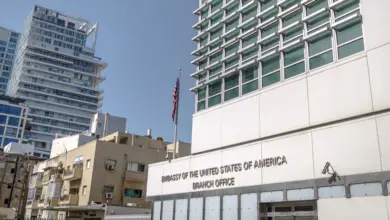Ahmed Hassan is a government employee who passes by the Giza Security Directorate and the Israeli Embassy every day on his way back home. But the night of 9 September was different. He found himself caught in the middle of a battle between the police and protesters, and was arrested by the army. Now he is facing charges of assaulting a Central Security Forces (CSF) officer and attacking public property.
Two protesters were killed by live bullets and 1049 injured in clashes that erupted between Central Security Forces and protesters last week in front of the Giza Security Directorate, following the storming of the Israeli Embassy, which is located across the street.
The police accused protesters of attacking the directorate’s building and setting fire to 56 police cars. As a result, the ruling Supreme Council of the Armed Forces (SCAF) announced a broadening of the scope of the Emergency Law until June 2012, extending the existing law into its 54th year.
“I was arrested by the military. An army major grabbed me and kept giving me electric shocks with his electric baton until I passed out. Then, when I woke up, he dragged me to a side street, where I found more people arrested. Two soldiers were continuously giving me electric shocks along the way,” said Hassan to Al-Masry Al-Youm in a phone interview from inside Tora prison, where he awaits trial in a State Security Court, along with 17 others arrested along with him.
After the police made the 18 men sign statements, they were transferred to the Military Prosecution, interrogated and then taken to Tora prison, where they spent the night being tortured by the police.
“When we reached the prison, we were forced to take off all of our clothes, stand naked on our fingertips and lean our heads to the wall, while informers and policemen beat us with sticks on our backs, slapping and insulting us for about three hours under the supervision of the police officers,” said Hassan.
Among those arrested with Hassan was Mohamed Gomaa, a journalist, who was caught video-taping the clashes during the night, but was later released by police officers in the Giza Security Directorate before being transferred to prison.
Gomaa was video-taping military police officers as they carried out their attacks, when a man in plain clothes hit him on the back of his head, shouting: “What are you shooting?” Then a group of people beat him until he was taken away by an officer from the CSF and handed over to the military.
“They took me to a side street next to the Saudi Embassy and made me sit on the ground along with another ten arrested people. Every time a soldier passed by me, he punched me in the face and kicked me, knocking me to the ground,” said Gomaa to Al-Masry Al-Youm.
“Then people in plain clothes kept coming, spitting on us and insulting us, while one took pictures. If anyone dared say a word, the soldier would stamp on his head.”
There was a 15-year-old boy among those arrested, bleeding from a deep cut in his head. A solider asked the military officer if they should put him an ambulance, but the officer’s reply was, “Let him die. I am not the one who wounded him,” according to Gomaa.
“This was the moment I knew the meaning of military rule. I felt there is no hope in this country. I don’t want to live here anymore,” said Gomaa in tears.
The detainees were kept in this position for about 45 minutes before they were taken inside the Giza Security Directorate.
“Soldiers dragged me by my leg along the ground for a whole street until my clothes were ripped,” he said.
Gomaa recounted the night’s events, saying that clashes between protesters and the CSF started when two police armored vehicles approached the Israeli Embassy’s building at high speed, hitting some of the protesters there. The incident angered many protesters, causing them to throw rocks at vehicles, which then turned back, with protesters chasing them all the way to Giza Security Directorate building.
Some protesters began to attack the Security Directorate building, and flames were then seen in the garden next door. The CSF launched heavy volleys of tear gas canisters, to which protesters responded with rocks.
According to Gomaa, men in plain clothes were attacking protesters alongside the CSF.
“I saw some CSF and men in plain clothes break into a shop and take food and drinks,” said Gomaa.
About 200 people were arrested that night and the following day to be tried in the State Security Court, which applies the Emergency Law.
The protests outside the Israeli Embassy were initially sparked by the killing of six border guards on 18 August by Israeli military forces in Sinai. The Israeli solders were pursuing suspected Islamist militants across the border after a series of terrorist attacks on Israeli citizens near Eilat. At least eight people were killed in the terrorist attacks.
Fifteen political movements and parties have called for a march on Monday from Tahrir Square to the cabinet in protest at the recent expansion of the powers of the Emergency Law.
The Ministry of Interior could not be reached for comment on the allegations of torture.




